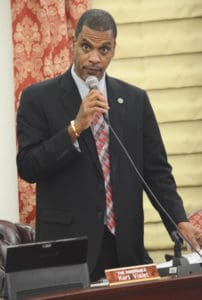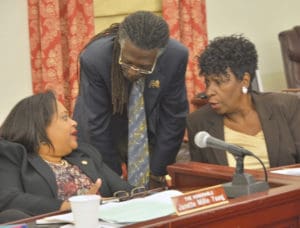
With bitter opposition from the minority caucus, the V.I. Legislature on Tuesday gave final approval to tax increases on tobacco, alcoholic drinks and sodas, fees on timeshares and a floor of $360 for exemptions on property taxes.
The measures are intended to both help the government raise funds to keep government agencies open amid ongoing budget shortfalls and reassure markets that have downgraded V.I. debt and are not lending to the territory. All three major ratings agencies downgraded the territory’s bonds to “speculative” status, with at least one specifically mentioning concern that Legislature may not have the stomach to increase taxes. (See: Calling for Tax Increases, Fitch Downgrades USVI Bonds Again)
Two of the measures are amended versions of proposals from Gov. Kenneth Mapp that are part of a five-year plan to reduce the territorial government’s structural deficits of more than $100 million a year.
Senators added more amendments Tuesday, clarifying them and reinstating some funding for back pay for government workers whose pay was cut during the 2011 fiscal crisis.
A third bill, introduced during Tuesday’s session, would put in place another in a long series of tax amnesties. It would last for six months and would waive interest and penalties on delinquent gross receipts, property and excise taxes from 2015 and before. It also mandates the Economic Development Authority create an “expedited application process” for EDA tax breaks and for the Department of Planning and Natural Resources to do the same for building permits. Senators amended the bill to also remove the governor’s veto over EDA tax breaks and to mandate the Division of Licensing and Consumer Affairs issue first-time business licenses in 30 days or less.
Tax amnesties like the one introduced during session have long been a favorite tool of the V.I. government. A 1999 U.S. Department of the Interior Inspector General report on V.I. property taxes found fault with the V.I. government’s 1996 property tax amnesty.
The federal inspectors wrote that “although the Government collected delinquent property taxes of $12.1 million during this period, we believe that the use of a program which forgives all penalties and interest for property owners who do not routinely pay their taxes undermines the integrity of the real property tax system. That is, taxpayers who do not pay their taxes for several years and then are forgiven all penalties and interest through a tax amnesty program are, in effect, rewarded for their nonpayment of taxes.”
Since that critical report, the V.I. government has instituted four separate Gross Receipts Tax amnesties, sometime for extended periods: in 2003; 2006-2008; 2008-2009 and 2009-2011. The government forgave $30.91 million in fees and interest while collecting $28.56 million in delinquent unpaid taxes, according to Internal Revenue Bureau data.
As the lawmakers began discussing the revenue measures, Senate President Myron Jackson said sometimes senators have to make difficult and unpleasant decisions.
“We have to make sure it benefits all of our residents. We also have to ensure that the needs of the people are met and that we are the movers and shakers of our own fate. Should we be the deciding factor of our own fate or do we prefer someone else like the federal government making that decision for us? We must do what is necessary,” Jackson said.
Sen. Jean Forde said “doing nothing is not an option.”
“We don’t’ want to send people home. … We don’t want a federal takeover and if we do nothing that is exactly what we are going to get,” Forde said.
Sen. Novelle Francis too raised the specter of a control board coming in, as has happened in Puerto Rico, while agreeing with critics that Gov. Kenneth Mapp had not set the best example.

“I agree the governor continues to bring people in,” Francis said. “And the governor has given pay increases. … But that is not the purpose of the bill(s) … It is to save our teachers, to save our police officers.”
“Let’s not pass this, people are going to start going home. Then what are we going to do?” Sen. Marvin Blyden said.
Sen. Sammuel Sanes defended the unpopular tax increases, saying they were not made in a vacuum or
on a whim but were a collaboration and group effort with government officials, businesses and residents in the community.
“We went from a measure that was extravagant on its figures and we cut it down by 53 percent. Although, the bill passed we still can make revisions and work towards further amending it. There is no such thing as a perfect bill,” Sanes said.
“I am not willing to roll the dice and say that all the government officials who appeared before us are lying,” Sen. Kurt Vialet said. “I agree that whatever action is taken will be a bitter pill to swallow,” but once the situation is back under control they could potentially be repealed, he said.
Non-majority members of the Legislature uniformly, vehemently opposed the unpopular increases.
“I submitted a list of economic initiatives that are included in the Special Order. Take and use all of them and do not approve the Sin Tax measure,” Sen. Alicia “Chucky” Hansen said.
Referring to the majority she continued, “You have the power to preempt bills and that’s what is happening now. Why do you want to place taxes on the people? Let’s discuss alternative measures rather than kicking people out of business and out of their homes,” she said.
Hansen has not presented any data suggesting any of her proposals would generate similar amounts of money as the proposed taxes. At least one of her ideas; removing the requirement that businesses pay their taxes before they get or renew a business license, appears likely to reduce tax revenues by reducing the incentives to pay them. Another; extending the date of the Hotel Development Act, extends generous tax breaks for hotel developers that have not, so far, generated the hoped-for hotel development. Hansen also proposed selling off government-owned land. Assuming there is a market for the land, that would provide a one-time windfall, followed by some increase in ongoing property taxes, so long as the property is not sold to companies receiving EDA or RTPark tax breaks, and no government agency rented any of it back. She has also proposed tax increases on the territory’s one casino and two slot machine parlors, as an alternative to increasing taxes on alcohol and tobacco.
Sen. Positive Nelson argued the government should perform an audit of itself before increasing taxes.
“More money, more money, show me the money. None of us have a true account of this government. It would be easier for me to support this bill if there was a full audit on the Government of the Virgin Islands, the land and the workforce. We also need to evaluate the overall financial system,” Nelson said.
The legislation approved Tuesday adds about 25 cents in new taxes to the cost of beer and $11 to the cost of a carton of cigarettes. Liquor taxes remain about $6 per case, or 50 cents per bottle, after an amendment Tuesday.
Real estate taxes will not go up, but those claiming exemptions will not be able to reduce their property tax bills to less than $360. If the tax bill is already less than $360 without exemptions, the tax bill will be unchanged. The law applies only to taxpayers claiming exemptions.
Under the terms of the bills, the Bureau of Internal Revenue will assess timeshare owners the existing hotel room occupancy tax of 12.5 percent and repeal the former timeshare occupancy tax. It will also assess a $25 per day fee for timeshare units.
During committee hearings, Finance Commissioner Valdamier Collens testified the amended versions of the taxes should generate about $25.5 million per year for the government’s General Fund – about $3 million less than the governor’s original versions.
An amendment from Sen. Neville James would devote $600,000 in the Tourism Advertising Revolving Fund for special marketing campaigns promoting duty free shopping in the territory. Those funds, derived from hotel occupancy taxes, are already used for advertising, so the appropriation is not new spending so much as a specific earmark for existing spending.
Another amendment from James appropriates $25,000 for the Bureau of Economic Research to perform an impact analysis on how the taxes actually affect business, the economy and tax revenues after they are in place.
In committee, senators removed a requirement that a portion of funds be set aside for back pay for government workers affected by 8 percent pay cuts in 2011. A recent court opinion found the cuts improper. As of yet, no court has directed the government to pay workers the difference. Removing that set-aside allowed senators to reduce the level of proposed taxes without much impact on its contributions to the government’s coffers. Tuesday, the majority senators voted to reinstate the set-aside, but with a delay.
The amendment devotes 15 percent of the $25 per day time share fee to the Tourism Advertising Revolving Fund and 85 percent to the government’s General Fund for 2017, 2018, 2019, 2020 and 2021. Four percent of the money to the General Fund is to go to the territory’s hospitals “at the discretion of the director of OMB.”
Then, 40 percent of the revenues are to go to a fund reserved for paying back government workers’ lost wages, in 2022, 2023 and thereafter until it is all paid. Forty-five percent would go to the General Fund and 15 percent to the Tourism Advertising Revolving Fund.
The Legislature and executive branch routinely make many exceptions every year to the many similar percentage set-asides already in V.I. law, as financial conditions and administration agendas direct, making it unclear if such provisions are meaningful.
Previous amendments to the bills:
– Prohibit the use of nonessential government vehicles after the end of the work day;
– Mandate a 30 percent reduction in vehicle use;
– Require government cell phones be returned within 30 days;
– Mandate that agencies are to coordinate with entities that have teleconferencing to meet by teleconference instead of paying for members to travel between islands;
– Prohibit government officials from staying overnight in hotels on holidays;
– Limit government fuel use to 10 gallons every two days and mandate users of vehicles to maintain fuel logs and turn them over to Property and Procurement for compilation.
– Mandate the Bureau of Economic Research to analyze the impact of the legislation and produce quarterly reports to the Legislature.
– Prohibit EDC tax break beneficiaries from converting property taxes to timeshares and require that they lose their tax breaks if they do.
Voting for each of the bills, as amended, were: Blyden, Forde, Francis, Jackson, James, Sanes, Vialet, Sens. Brian Smith and Nereida “Nellie” Rivera-O’Reilly; all members of the governing majority. Voting no were Hansen, Nelson, Sens. Dwayne DeGraff, Janette Millin Young and Tregenza Roach – all members of the non-governing minority coalition.
No one was absent. One seat is vacant pending a special election April 8.





